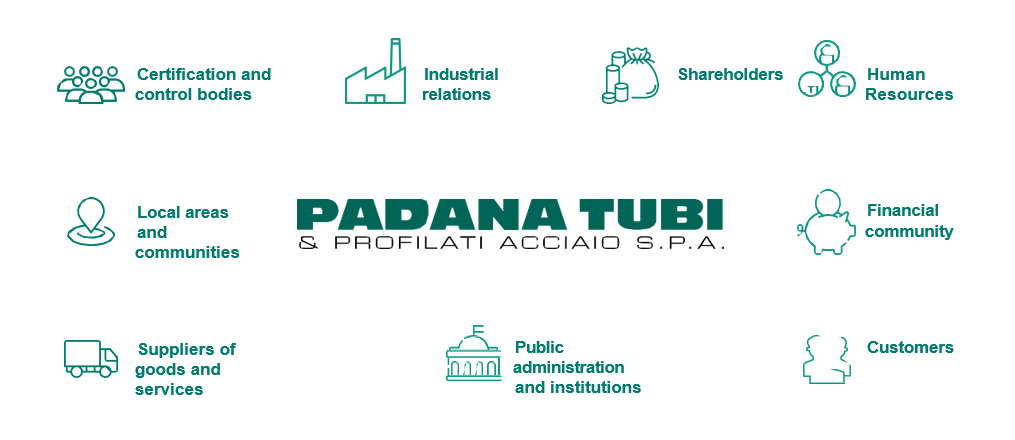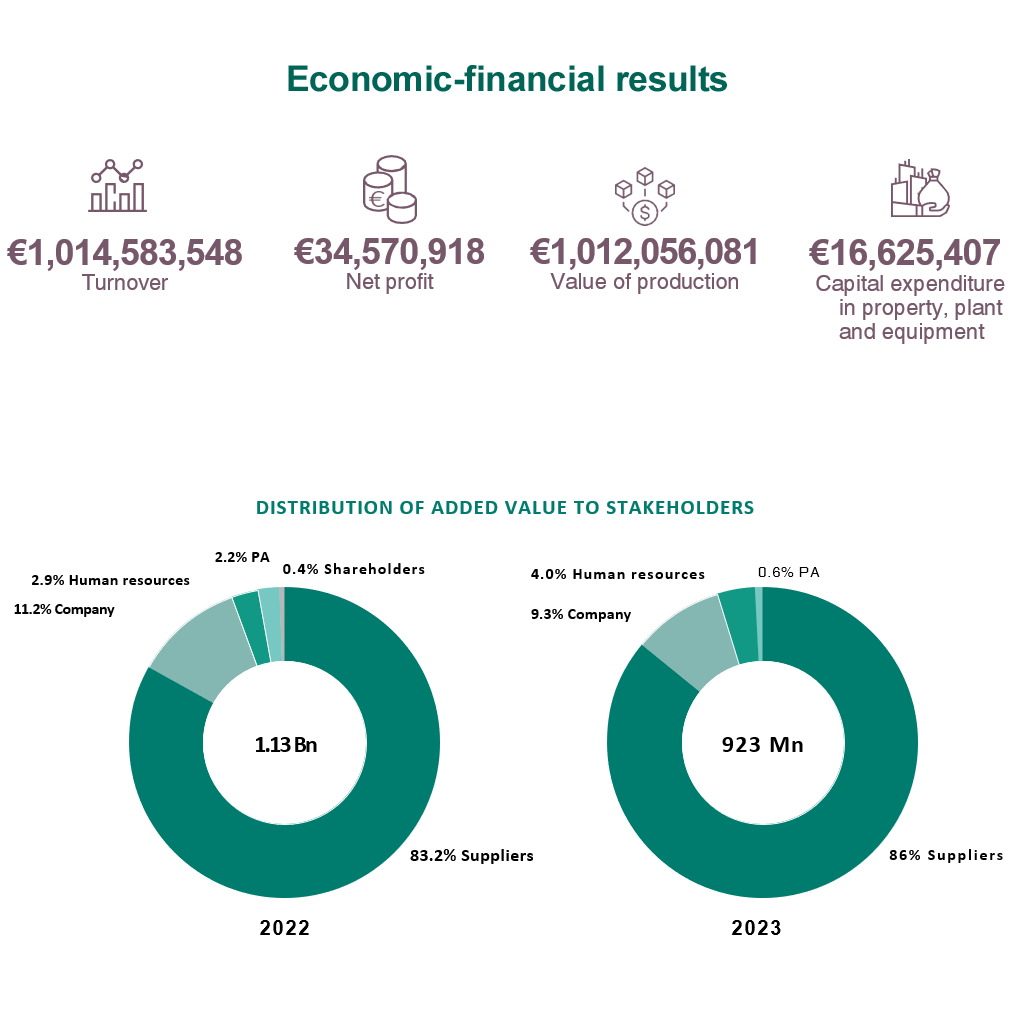Sustainability
Dear Readers,
We are pleased to present the new Padana Tubi Sustainability Report for 2023, which comprehensively details our activities in the ESG areas according to the Global Reporting Initiative (GRI) standards.
With an overarching commitment to sustainability, we share with our stakeholders the environmental impact of our business activities, initiatives and goals for health and safety at work, economic and financial underpinnings and indicators and the principles that inspire corporate governance.
Over the past year, various global geopolitcal events have created a climate of uncertainty and negatively impacted economic systems.
The ongoing war in Ukraine, leading Europe to extend economic sanctions against Russia, has resulted in additional restrictions in the steel sector.
In the second half of the year, the Middle East experienced destabilisation due to escalation of conflict. Consequently, new questions have arisen regarding energy products, primarily gas and oil, with concerns about potential price issues. Navigation in the Suez Canal has been, and continues to be, threatened by military attacks, leading to extended shipping routes to Europe and increased international freight costs, including for steel imports and exports.
China’s industrial and infrastructural growth has not shown the expected vigour following the end of the Covid pandemic, and international prices of steel as well as related raw materials are heavily negatively affected by the weakness of demand and production in China and throughout the Far East.
The increase in interest rates, which began in the second half of 2022 and continued into 2023 to contain the growth of inflation, has exacerbated the crisis in the construction sector and many steel-consuming industrial sectors across Europe.
While 2022 was characterised by the uncontrolled exponential growth in gas and electricity prices, 2023, partly due to reductions in industrial consumption, has seen a progressive and lasting decline in prices, benefiting industrial costs.
In this complex scenario, the role of the enterprise as a social and environmental community is becoming increasingly evident. It is important and necessary to consolidate virtuous relationships with its territory in a broad sense, to value the skills of the workers and protect their safety, to seize improvement opportunities from clients and suppliers, and to manage business activities in an ethical and transparent manner.
As you will see upon reading this report, the issues we have identified as “material” have prompted us to define objectives and embark on improvement paths in significant environmental, social, and governance areas.
Among these, to name a few, the process of obtaining EPD (Environmental Product Declaration) certifications for all product families has been successfully completed. The official declarations from the relevant authority were issued at the beginning of January 2024, underlining the company’s commitment to monitoring its environmental and social impact.
Audits are continuously carried out to maintain all the organisation, product, and process certifications obtained over the years (ISO 9001, ISO 45001, ISO 14001, ISO 14064).
The attention and vigilance on workplace safety are extremely high, which is an absolute priority for the entire organisation. This includes widespread training, continuous exchanges, and discussions between the various company entities and workers to promote increasing awareness and the dissemination of a safety culture.
Europe is clearly pursuing a path of change in social, environmental, and economic dynamics, increasingly driven by the growing awareness of new generations, who anticipate and lead the choices and methods of institutions.
This requires, and will increasingly demand, synergistic and coordinated actions from production chains. It is necessary to abandon old competitive logics confined to short-term scenarios and instead embrace a long-term vision capable of preserving value growth and the survival of European industry.
It is a challenging path, yet full of opportunities, in which we are certain that Padana Tubi, thanks to the contribution of its stakeholders, will continue to be a credible and motivated player.
We leave you with these thoughts as you review our Sustainability Report, appreciative of any contributions you, our stakeholders, may wish to provide
Famiglia Alfieri
The path taken
In recent years, companies operating in the steel sector have been paying more attention to sustainability issues, particularly environmental issues. In this context, investments aimed at reducing the environmental impact associated with production have been significantly increasing.
For some years now, Padana Tubi has been integrating sustainability into its business strategy; leading to a structured process of growth and awareness.
The publication of the Third Sustainability Report represents Padana Tubi’s commitment to meeting the expectations and needs of stakeholders; at the same time, it is an act of transparency and social responsibility that is carried out with determination.
Corporate choices, decisions, behaviour, and performance are closely correlated not only with the objectives the Company seeks to accomplish and the anticipated results but also with a perspective that integrates the pillars of sustainability: attention to certifications related to product quality and the management system, emission monitoring, the adoption of measures to optimise energy consumption, and the calculation of the environmental footprint. Padana Tubi’s long-term vision and sustainable strategy also focus on attention to its people and the enhancement of skills.
Stakeholder Mapping and Engagement
Stakeholders are entities or individuals who can be significantly influenced by an organisation’s activities, products, and services, or whose actions can affect the company’s ability to successfully implement its strategies and achieve its goals. Padana Tubi maintains direct relationships with its stakeholders aimed at continuous collaboration between the parties.
Below is the stakeholder mapping, which provides a summary representation of Padana Tubi’s main Stakeholders, divided into a macro level and a more detailed level, their interests, and the related methods of engagement.


Client orientation: a relationship built on trust
Client relationships and their satisfaction are essential elements for good market positioning. At the core of a continuous and profitable relationship is the ongoing improvement of the quality of service offered and transparent, digital communication.
The constant pursuit of maximum client satisfaction and their protection is one of Padana Tubi’s primary objectives, whose approach is focused on understanding their needs.
As of 31 December 2023, Padana Tubi had 835 clients with open accounts, 315 of which are in Italy, and the remaining 520 predominantly in Europe.
Sales are approximately 25% within Italy and 75% abroad, predominantly in European countries.

Materiality analysis
Materiality analysis is a significant part of the corporate sustainability journey. It is a tool that helps define the issues that have, or could have, a substantial impact (positive or negative) on the actions and decisions of the company or its stakeholders. Consequently, it provides guidelines to follow for achieving positive outcomes and responsible growth in governance and sustainability dimensions in its three areas:
Economic, environmental, and social.
The materiality analysis led to a re-evaluation of the topics considered material for Padana Tubi in the previous reporting year. These topics, in turn, are the result of a documentary analysis of Padana Tubi’s ESG issues, consistent with the materiality derived from the SASB analysis and the GRI standard study. The topics were then reprioritised by the company’s management, which assessed the importance of individual issues through a comparative workshop.
The topics identified as highly material and priority for this Sustainability Report, are the following:

For further details please contact sustainability@padanatubi.it





